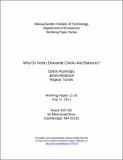Why Do Voters Dismantle Checks and Balances?
Author(s)
Acemoglu, Daron; Robinson, James A.; Torvik, Ragnar
DownloadAcemoglu11-20.pdf (299.7Kb)
Terms of use
Metadata
Show full item recordAbstract
Voters often dismantle constitutional checks and balances on the executive. If such checks and balances limit presidential abuses of power and rents, why do voters support their removal? We argue that by reducing politician rents, checks and balances also make it cheaper to bribe or influence politicians through non-electoral means. In weakly-institutionalized polities where such non-electoral influences, particularly by the better organized elite, are a major concern, voters may prefer a political system without checks and balances as a way of insulating politicians from these influences. When they do so, they are effectively accepting a certain amount of politician (presidential) rents in return for redistribution. We show that checks and balances are less likely to emerge when (equilibrium) politician rents are low; when the elite are better organized and are more likely to be able to influence or bribe politicians; and when inequality and potential taxes are high (which makes redistribution more valuable to the majority). We show that the main intuition, that checks and balances, by making politicians “cheaper to bribe,” are potentially costly to the majority, is valid under different ways of modeling the form of checks and balances.
Keywords: corruption, checks and balances, political economy, redistribution, separation of powers, taxes.
Date issued
2011-07-17Publisher
Cambridge, MA: Department of Economics, Massachusetts Institute of Technology
Series/Report no.
Working paper (Massachusetts Institute of Technology, Department of Economics);11-20
Keywords
Corruption, Checks and Balances, Political economy, Redistribution, Separation of powers, Taxes
Collections
The following license files are associated with this item: